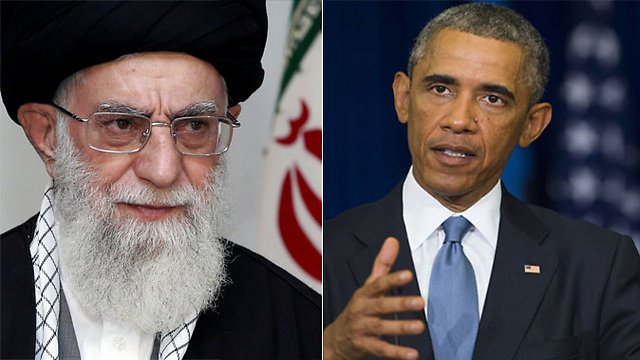White House spokesman Josh Earnest responded to the report, and said that US policy towards Iran has not changed.
According to the report, which cited people briefed on the correspondence, the letter was sent secretly in the middle of last month, as US-led forces were already hitting Islamic State group targets in Iraq. Earnest said he could not comment on private correspondence between Obama and a world leader.
The reports publication comes after Obama lost control over the Senate during his mid-term elections this week and ahead of an end of November deadline for a nuclear deal with the Islamic Republic.
According to the Wall Street Journal, the letter appeared aimed both at strengthen the US-led international campaign against the Islamic State group, but also to push Iran’s religious leader closer to reaching a nuclear deal with the West.
The sources that spoke to the Wall Street Journal stressed in the letter, Obama stressed that any cooperation in the fight against the Islamic State was largely contingent on Iran reaching a nuclear deal with the West by November 24.
Obama recently committed that "There’s a sizable portion of the political elite that cut their teeth on anti-Americanism… Whether they can manage to say ’Yes’ (to cooperation or a nuclear deal) is an open question.”
The letter was the fourth known time Obama has written Iran’s most powerful leader, and according to the Journal, underscores Obama view that Iran is key to implementing the now-lame duck president's regional plan.
Iran and Republicans
Republicans have long accused Obama of weakening America's global leadership by failing to act more forcefully in the world's crises. Obama and his aides have pushed back against critics they say are promoting reckless military action.
Having taken over the Senate and increased their majority in the House of Representatives, Republicans will be in a stronger position to push for a harder line in talks between world powers and Iran aimed at curbing its nuclear program and preventing it from developing an atomic bomb, which Tehran denies seeking.
With a Nov. 24 deadline looming for a comprehensive deal, Republicans fear that Obama will make too many concessions for easing sanctions that have crippled Iran’s economy. He could suspend some sanctions on his own but would eventually need a congressional vote to lift the measures permanently.
An accord with Iran after decades of estrangement with the United States would be a big boost to Obama’s international legacy, which so far has lacked a signature major success.
New York Republican Rep. Peter King said that with his party’s control of the Senate, Republicans would be able to retaliate with new legislation if Obama tries to bypass them on Iran.
“If he tries to be cute and sneak something through, there may be a backlash,” King told Reuters.
Another source of continuing friction will be Obama’s handling of the battle against Islamic State, which is also known as ISIL or ISIS and has seized large swathes of Syria and Iraq.
Leading Republicans insist that Obama’s objective to “degrade and ultimately destroy” Islamic State will fail unless he goes beyond the current bombing campaign and limited assistance to moderate Syrian rebels.
On the heels of the mid-term outcome, some are demanding a reversal of Obama’s refusal to send more US forces to Iraq, a reflection of his reluctance for large-scale use of US military power, especially in the volatile Middle East.
“That seems to me to be physically impossible to stop ISIS without boots on the ground,” said Republican Utah Senator Mike Lee, a member of the Senate Armed Services Committee.
Reuters contributed to this report
















